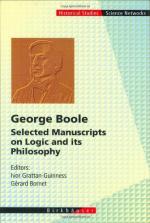|
This section contains 739 words (approx. 3 pages at 300 words per page) |

|
British Mathematician 1815–1864
Digital logic is the set of rules applied to data (numbers, symbols, words) that are entered into a computer. These instructions direct computers and are called machine code. This code uses the binary digits 1 and 0 to switch transistors on or off. The basic operators that perform these tasks are AND, OR, and NOT. A hundred years before electronic computers were conceived, George Boole proposed this binary or digital logic.
Born to working-class English parents, Boole later supported himself and his parents as a school instructor. Frustrated by the inferior mathematics texts used to educate pupils, Boole was led to change the world of numbers. With only a basic science background, Boole labored 5 years to learn mathematics, eventually publishing in the Cambridge Mathematical Journal. His reputation was heightened in 1847 when he published The Mathematical Analysis of Logic, which introduced Boole's ideas on the two-valued (presence...
|
This section contains 739 words (approx. 3 pages at 300 words per page) |

|


